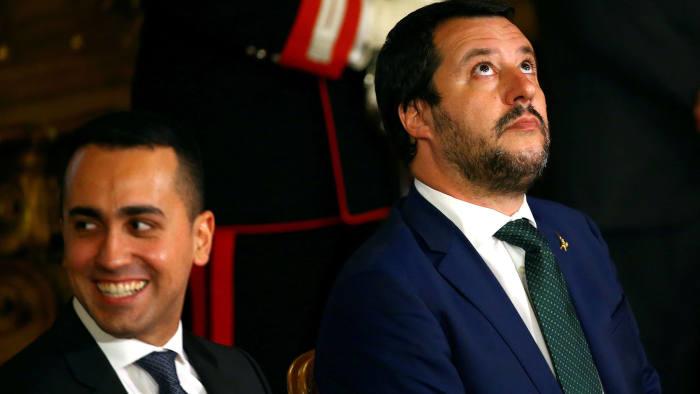With the Italian government seemingly on the verge of collapse every few months, and with tensions between the two parties in the ruling coalition – Five Star and the League, especially as the former has been sliding in the polls at the expense of the latter’s rising popularity – escalating in recent weeks, it was only a matter of time before Italian bondholders had a PTSD flashback to May 2018 when the populist government first stormed on the stage, sending Italian bonds plunging. All that was missing was a catalyst.
Said catalyst emerged as a lingering dispute within Italy’s ruling coalition over the future of a train, or technically a high-speed rail link with France, escalated suddenly on Thursday, once again raising the risk of a government collapse, with the 5-Star chief accusing his partner of acting irresponsibly.
The Alpine rail line has been backed by the ruling League party but is fiercely opposed by its coalition partner, the 5-Star Movement, which argues Italy’s share of the funding would be better spent upgrading existing roads and bridges. And after League leader, the outspoken Matteo Salvini who continues to enjoy rising popularity with every new poll, said in an evening television interview he would not back down and his party would “never sign” a decree to block the project, 5-Star chief Luigi Di Maio accused him of threatening to bring down the government.
While the tensions between Di Maio and Salvini were for the most part contained before closed doors, the animosity between the two “equal” vice premiers erupted in public when Di Maio said in a statement that Salvini “will bear the responsibility before millions of Italians” adding that he considers “this to be irresponsible behavior” adding that he was “stunned by the threat of a government crisis” coming from Salvini.
The TAV project (Treno Alta Velocita) is a joint venture between the Italian and French states to link the cities of Turin and Lyon with a 58-km (36-mile) tunnel through the Alps on which work has already begun. According to Reuters, the EU has pledged to fund up to 40 percent of costs, Italy up to 35 percent and France up to 25 percent.
Earlier on Thursday, Italy’s Prime Minister Giuseppe Conte said that recently updated traffic projections for the line warranted a review of the project’s long-term viability and, if necessary, a renegotiation of the way the funding is split. Conte told reporters he had strong personal doubts about the validity of the venture and he would take responsibility for a final decision based on a cost-benefit analysis already carried out by the government.
That analysis, commissioned by Transport Minister Danilo Toninelli, a 5-Star politician, found the TAV was a waste of public money, estimating the economic return would be a negative balance of 7.0 billion-7.8 billion euros ($7.9 billion -$8.8 billion). Conte, who is technically not a member of either party but is closer to 5-Star, called the funding of the TAV “iniquitous” and said he would speak to France and the EU “to share our doubts and perplexities.”
However, as Reuters noted, despite his doubts, Conte acknowledged the ruling coalition remained “deadlocked” over the issue, as a Monday deadline approaches when the tenders must be launched to build or block key parts of the project.
And while Conte dismissed media speculation the Alpine rail link could be the issue that finally brings the government down as “absurd” saying that the dispute between the ruling parties was transparent and constructive, others disagree, and on Thursday night, Matteo Salvini who is currently Italy’s most popular politician and many believe can become Italy’s next premier outright without the need for a colaition, said he was ready “to go all the way” on the TAV dispute.
On Friday the spat continued, and the ruling coalition made no progress in defusing the dispute ahead of Monday’s looming deadline.
As Reuters updates, on Friday Salvini walked away from the negotiating table telling reporters he would not reopen discussion until after the weekend, in a move that seemed designed to allow the tenders, due to be opened on Monday, to go ahead.
In turn, a clearly displeased Di Maio said during a news conference that “(Salvini) can’t tell me ‘we’ll see each other on Monday’. This needs to be a weekend of work,” adding that he had asked Prime Minister Giuseppe Conte to do his best to block the tenders.
Some League politicians proposed that the tenders could be launched on schedule but with a clause that they could be revoked depending on the outcome of the coalition dispute. Di Maio rejected this, saying it made no sense to commit money to a project and then discuss whether to go ahead with it.
“Putting the government at risk over the TAV is absurd,” he said, appealing to Salvini to work with him for a deal, however as of this moment, Salvini has clearly refused to engage in negotiations, raising the probability that a government collapse could be imminent, and resulting in another episode of Italian bond volatility as the next Italian government will likely be even more populist than the current iteration.
For now markets, which have generally stopped responding to newsflow and instead are only focused on what central banks do next, have shrugged off the mounting coalition tensions, and on Friday Italian 10-year bond yields were heading for the biggest weekly drop since September, and the spread over German Bunds hovered around 245 basis points, compared with a recent high of 280 on Feb 22, on the back of the ECB’s TLTRO announcement which some have speculated makes the probability of a ruling crisis even greater as the risk of a market crash has been pushed back largely thanks to Draghi’s surprisingly dovish reversal unveiled on Thursday.
via ZeroHedge News https://ift.tt/2HltAgF Tyler Durden
